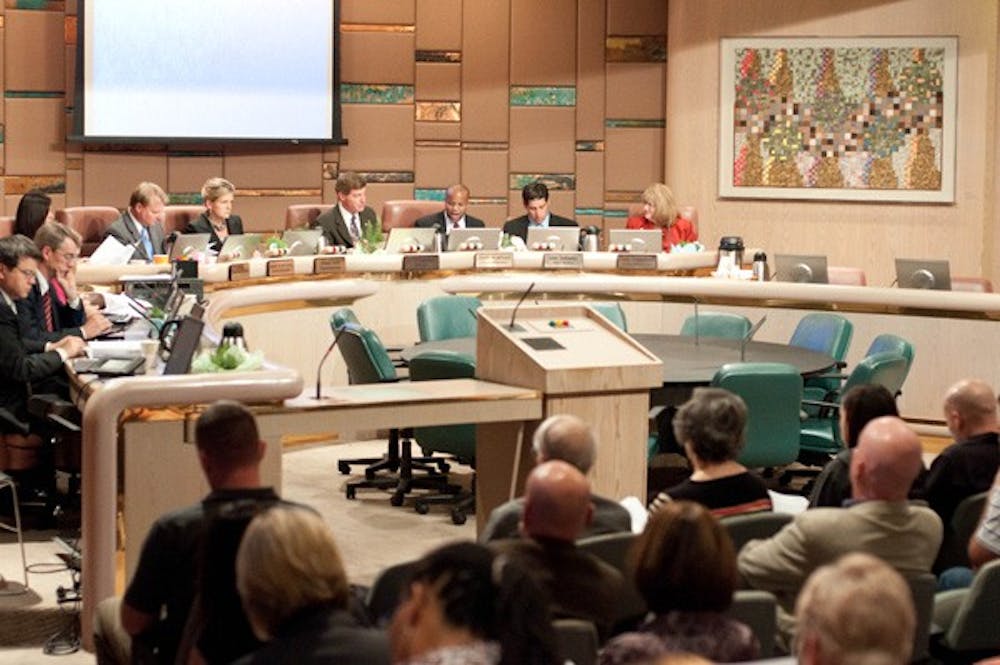The Tempe City Council approved a zoning ordinance Thursday night that will restrict where medical marijuana dispensaries and cultivators can be established in the city.
The Council voted unanimously to approve the ordinance, similar to other ordinances passed by Phoenix, Tucson and Globe in accordance with Proposition 203, the medical marijuana initiative approved by voters in November.
The Tempe ordinance restricts dispensaries and cultivators to commercial districts and limits the distance they can be from facilities like schools and churches, among other requirements.
The Council estimates there will be about two dispensaries in Tempe.
Tempe resident Julie Lind spoke during the meeting in favor of the ordinance, and said it was necessary to take all precautions.
“I am here tonight to support every effort by this Council to regulate, restrict and respond to the effects of the growing, distributing, using and, sometimes and likely, abusing of marijuana in Tempe,” Lind said.
Others spoke to the Council in protest of some of the restrictions in the ordinance, including Tempe resident Al Charlesworth, who said the maximum square footage of the dispensaries, about 1,400 square feet, was restrictive.
The ordinance allows only one doorway for entrance and exit from a dispensary and cultivation facility and, under city fire codes, the square footage of a facility with only one doorway may not exceed 1,400 square feet.
“That would be insufficient for a dispensary to grow enough medicine for the patient base that they should have,” Charlesworth said.
The state marijuana law states that dispensaries must grow about 70 percent of their inventories. The maximum square footage is not sufficient to grow that much marijuana, Charlesworth said.
Tempe Mayor Hugh Hallman said the state is requiring dispensaries to grow a majority of their inventories, so this type of complaint would be better addressed to the state.
“I have yet to see a lot of pressure being put on the state to change that requirement,” Hallman said.
During the first public hearing for the ordinance on Jan. 13, Tempe residents raised similar concerns about some of the restrictions on dispensaries and cultivators.
Some opponents said limiting dispensaries and cultivators to commercial and industrial districts would limit patient access to the facilities and encourage crime because of the lack of travel in these areas.
Tempe’s Development Review Commission began drafting zoning regulations for medical marijuana in late November and voted to recommend that the City Council adopt this ordinance on Dec. 14. The commission’s chair and vice-chair, Mike DiDomenico and Dennis Webb, dissented.
DiDomenico said he disagreed with the ordinance the Council recommended because it was too restrictive.
The ordinance encourages dispensaries to be located in areas that are not readily visible or accessible to members of the public who need it, he said.
“If our intention is the convenience and safety of our citizens who need this product for whatever reason, then in my mind our ordinance should encourage it to be done in an area that’s safe and secure and readily accessible to the public,” DiDomenico said. “The safest place to have them is between Main and Main, out in the open where everyone’s eyes are on them, as opposed to what I think our ordinance is encouraging, which is poorly-lit industrial parks.”
He said the fear lawmakers have about dispensaries and cultivators bringing crime is exactly why industrial areas are not where they should be located.
“The very bad actions that we’re worried will happen in the wee hours of the morning and late at night, they’re more likely to happen in an industrial park with very little traffic as opposed to a major retail environment,” DiDomenico said. “To me it was just counterintuitive.”
ASU spokeswoman Sharon Keeler said the University is adhering to federal law regarding medical marijuana on campus, and will continue the University’s current policy.
“Because of our obligation under federal law, the University will continue to prohibit the possession and use of marijuana on its campuses,” Keeler said.
Reach the reporter at ymgonzal@asu.edu





